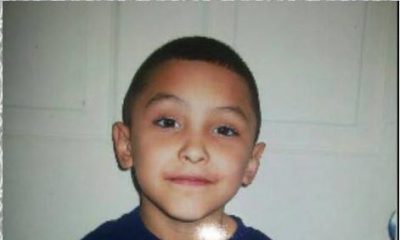Features
Tosin Nguher: Torture Still Happens in Nigeria
 “On 17 September 2013, about 5 policemen came to my house to arrest me. They did not tell me the reason for my arrest. The first place they took me to is SOS (Swift Operation Squad, a special police unit). They ask me what I do for a living. I tell them I work in a timber business…. Then they took me to temple (a special room for torture in the station). The temple is where they torture people. They took me to the temple on the same day at 11pm.
“On 17 September 2013, about 5 policemen came to my house to arrest me. They did not tell me the reason for my arrest. The first place they took me to is SOS (Swift Operation Squad, a special police unit). They ask me what I do for a living. I tell them I work in a timber business…. Then they took me to temple (a special room for torture in the station). The temple is where they torture people. They took me to the temple on the same day at 11pm.
They handcuffed my legs and tie it with rope. They now carry a big rod and cross through my leg and hands. One person lifts one side of the rod: the other person lifts the other rod. They hang me up leaving the weight of the rod on me. They now use machete, (and) one pipe iron to torture me. They tortured me in my chest, head, stomach, leg and every part of my body. By the time they torture (d) me, torture (d) me, torture (d) me, there was a lot of blood. They tortured me on my heart, my face, my waist. There are wounds on my back. My mouth was full of blood. I wanted to say help me but all that came out was blood.”
They tortured me until I lose control, until I collapse. I fainted totally. I lost control of my body. Later I woke up and found myself lying in my pool of blood. When they saw that I am awake, they ordered me to pack (pick) up my blood and eat it. The blood was mixed with sand but they told me to eat it. I ate everything. It’s smelly. I do it.
They gave me a paper and told me to sign. I wanted to know the content of the paper but they used their gun to hit my head. I could not read what they wrote inside the paper. I just signed.”∗
This is a true account of a victim of torture and ill treatment by the Nigeria Police. Stories like the one above are surprisingly still quite common in Nigeria, even till date, when we are meant to be enjoying the benefits of being a democratic society.
This is also in spite of the fact that Nigeria is signatory to the United Nations Convention against Torture (CAT) and its Protocols. A country is truly democratic when basic human rights are respected. The account above clearly shows a violation of the fundamental right of that person to be heard and freedom from torture, cruel and other inhuman or degrading treatment. The latter right is so fundamental and is a universally accepted right, which should not be set aside regardless of circumstances, be it war, insecurity or for any other reason, known as a jus cogens norm.
In a democracy, one of the benefits all citizens should expect is legal protection: an inherent respect for human rights and its established rules, which ensures that all accused persons are tried fairly and also given an opportunity to defend themselves. Another right that should be protected in a democratic society is a guarantee that a convicted person and/or accused will not be subjected to torture or ill treatment or punishment.
It is sad that we still hear accounts of torture and ill treatment by the police, military and Para-military, against innocent citizens, in their fight against crime and insecurity in the country. We find out that a lot of innocent people have fallen victims of those who are supposed to protect and preserve their dignity and lives.
Some of us may ask: what if a person is actually guilty of a crime, is he not meant to suffer or get punished for that crime? The answer to that question is: “Yes, he should be punished”. However, punishment must come after all laid down laws, policies and measures, created to prosecute and ensure guilt of a criminal and give the right punishment for the crime(s) committed, have been duly followed. Regardless of the crime, which a person has committed, he or she is entitled to the fundamental right to be heard. Such a person must be found guilty beyond all reasonable doubt by a competent court first. A wise man once said: “Better that ten guilty persons escape than one innocent suffer” (Sir William Blackstone, Blackstone’s ratio- 1765). In Nigeria, unfortunately, the opposite is practiced; it is better for 10 (or hundred) innocent persons to suffer than for one guilty person to escape. This means that the need to find any person guilty in order to close a case far outweighs the need to apprehend the real perpetrator of a crime.
This is an unfortunate situation for our society and country as a whole, for the following reasons: i) the innocent continue to suffer for crimes of the guilty ii) the guilty walks free and continues to commit those crimes, knowing that someone else is suffering for his/her crime(s), iii) citizens live in fear, suspicion and distrust for security institutions, which are products of government, in other words, there is no trust for the government which is a product of the society. Now do we see a cycle forming?
It is no surprise that due to this, our society continues to experience stagnation in development. Lack of development causes poverty, poverty causes crimes to be committed- crimes that hardly gets solved, due to the competence or lack of it, lack of capacity and inability of our security agencies to carry out intensive forensic investigation into crimes, in ways that do not involve torture and/or ill treatment to get information or evidence.
Although research has shown that there is no perfect democracy anywhere in the world, there are still best practices of “imperfect democracies” that Nigeria should follow, from other developed nations. These are societies that have put in place, implemented and continue to implement measures, policies, and laws, which make democracy more enjoyable for their ordinary citizens. Nigeria has resources, if channeled to the right places, instead of being used to fatten some people’s pockets, to ensure that lives of all its citizens and dignity of their persons, regardless of their status in the society, are protected. I mean, what does it take to invest in forensic apparatus to ensure that a case is fully investigated, the real suspect apprehended, prosecuted and convicted for his/her crime?
Doing this builds confidence not only in the security agents, knowing that a painstaking/full proof process has taken place to apprehend a real criminal, but also the society (especially the less powerful/influential), knowing that they would not one day be captured, tortured and forced to confess to crimes that they have not committed.
Photo Credit: Dreamstime | Alexandr Stepanov
























